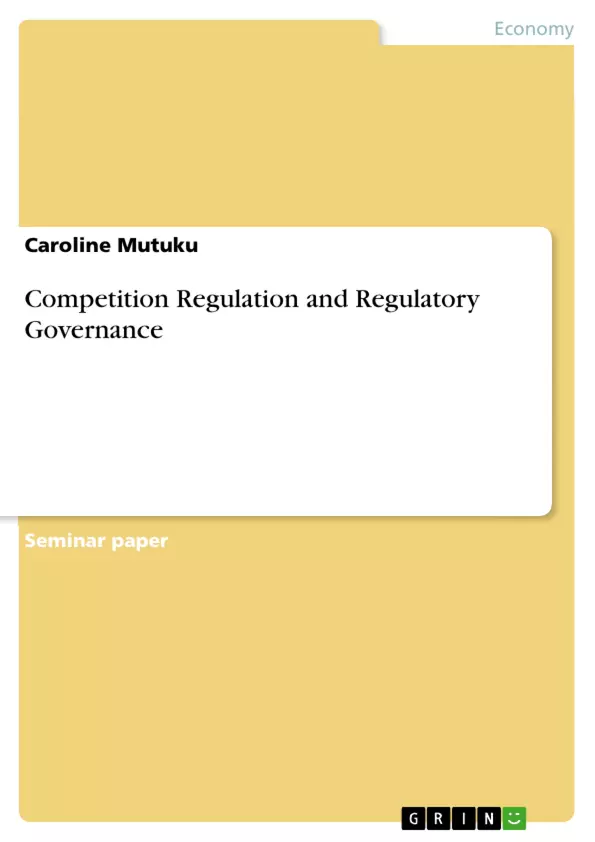In the global economy, privatization has become a central issue within economic reforms taking place in developing countries, and it is associated with the neo-liberal model reforms from the 1980's. Developing countries struggle to maintain high standards in public services such as water, energy, telecommunications, transportation, health, education, and, therefore, the adoption of policies to increase the effectiveness are needed. Privatization in theory should help these entities to become more efficient and benefit the majority of the population though, in practice, these objectives are rarely accomplished. The role of competition and regulation in such businesses are essential for development and growth, especially through the injection of private capital and fostering of competition. The principal common factor of these businesses is the natural component of monopolies which, according to Hellwig (2008), represents the use of a fixed network infrastructure that translates into largely sunk costs. Federal reforms aim for the improvement of performance in such important sectors of public services; however much of the research proves that; this has been reasonably unsuccessful in developing countries based on lack of institutional capacity. Even in theory, regulatory framework imported from developed countries was not suitable to the social and economic context in developing countries consequently the application of such previous experiences was not productive. This paper attempts to show that competition and regulation in the privatization process within developing countries could be successful if necessary reforms are based on the country’s economic, social, and political structure. As mentioned, the privatization process, as successfully applied in developed countries, requires significant adjustment for it to be pursued in transitional economies.
This paper has been divided into five sections. The first section focuses on the concepts of privatization, competition and regulation. The second analyses how the role of RIA (Regulatory Impact Assessment) could increase privatization efficiency. On the other hand, the third analyses some system utilities and privatization reforms; then how competition could improve the business on privatization. The fourth section provides the control legal framework for businesses to follow. The paper concludes with recommendations and a brief summary and critique of the findings.
Inhaltsverzeichnis (Table of Contents)
- Introduction
- Defining Terms
- 1.1: Competition
- 1.2: Regulation
- 1.3: Privatization
- Regulatory Impact Assessment in Developing Countries
- Network Utilities and Privatization
- The Importance of Competition and Privatization in Developing Countries
- Regulation as Legal Framework for Privatization
- Conclusion and Recommendations
Zielsetzung und Themenschwerpunkte (Objectives and Key Themes)
This paper examines the role of competition and regulation in the privatization process within developing countries, focusing on the challenges and opportunities associated with implementing effective reforms. It explores how competition can foster efficiency and growth while ensuring fairness and transparency in the market. The paper also analyzes the importance of regulation as a framework for privatization, emphasizing the need for tailored approaches that consider the specific economic, social, and political context of each country.
- The impact of privatization on developing countries and the need for effective reforms
- The role of competition in promoting efficiency and growth in privatized industries
- The importance of regulation in ensuring fair competition and preventing abuse of market power
- The challenges of implementing effective regulatory frameworks in developing countries
- The potential benefits of using Regulatory Impact Assessment (RIA) in the privatization process
Zusammenfassung der Kapitel (Chapter Summaries)
The introduction lays out the context of privatization in developing countries, highlighting the challenges of transitioning to a more market-oriented economy and the need for effective regulation and competition policies. The first chapter defines key terms like competition, regulation, and privatization, exploring their implications in the context of developing countries. The chapter discusses competition policies, the role of anti-trust rules, and the challenges of implementing competition laws in developing nations.
Schlüsselwörter (Keywords)
Privatization, competition, regulation, developing countries, regulatory impact assessment (RIA), network utilities, market power, anti-trust rules, economic reforms, legal framework, governance, efficiency, transparency, social and political context.
Frequently Asked Questions
What is the role of competition in privatization?
Competition is essential for development and growth, as it encourages efficiency and prevents the abuse of market power in privatized sectors like telecommunications or energy.
Why does privatization often fail in developing countries?
Failures are often due to a lack of institutional capacity and the application of regulatory frameworks from developed countries that do not fit the local social and economic context.
What is Regulatory Impact Assessment (RIA)?
RIA is a tool used to analyze the potential effects of new regulations, helping to increase the efficiency and transparency of the privatization process.
How do natural monopolies affect public services?
Natural monopolies, common in network utilities, involve high sunk costs in infrastructure, making effective regulation vital to ensure fair access and pricing.
What are the key recommendations for successful reforms?
Reforms should be tailored to a country's specific political, social, and economic structure rather than simply importing models from abroad.
- Quote paper
- Caroline Mutuku (Author), 2018, Competition Regulation and Regulatory Governance, Munich, GRIN Verlag, https://www.grin.com/document/432160



